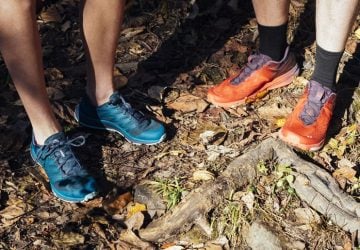Choosing the ideal trekking footwear hinges on innovative design and terrain versatility.

Understanding Trekking Footwear
When embarking on any trekking adventure, the importance of selecting the right
trekking footwear
cannot be overstated. Your feet are your primary mode of transportation in the wild, and the boots or shoes you choose will play a crucial role in your overall experience. Good trekking footwear provides support, comfort, and durability.
Importance of Innovative Design in Trekking Footwear
Innovative design
in trekking footwear is constantly evolving, offering new advancements in materials and construction techniques. Here are the key aspects to consider:
Material Quality
:Uppers
: Modern trekking boots often feature uppers made from synthetic materials or leather. While leather provides durability and robustness, synthetic materials offer lighter weight and faster drying.Outsoles
: The sole of your footwear is another crucial component. High-quality rubber outsoles with multi-directional lugs can provide an excellent grip, reducing the chances of slipping on uneven or wet terrain.Midsoles
: These provide cushioning and impact resistance. Modern designs use EVA (ethylene vinyl acetate) or PU (polyurethane) to strike a balance between lightweight and supportive structures.
Ergonomic Fit
:- Brands are now focusing on designs that hug the natural contours of your foot. This prevents blisters and offers a snug yet comfortable fit.
- Ankle support is also vital for reducing the risk of twists and sprains, especially on rocky trails.
Breathability and Waterproofing
:- Climatic conditions can vary significantly, thus breathable materials like Gore-Tex are essential to allow moisture to escape while keeping external water out.
- Waterproofing features, such as sealed seams, ensure that your feet stay dry even during unexpected rain or in wet environments.
Terrain Versatility: Adapting Your Trekking Footwear
One of the significant challenges in trekking is facing different types of terrain. The
terrain versatility
of your trekking footwear dictates how well you can adapt. Here’s how to match your footwear to different terrains:
Mountain Trails
:- Steep inclines and rocky paths demand boots with aggressive tread patterns and excellent ankle support.
- Look for models with rock plates to protect your feet from sharp objects.
Forests and Muddy Paths
:- Opt for footwear with anti-clogging outsoles that can handle mud and wet leaves without losing traction.
- Waterproof or water-resistant boots keep moisture out, while breathable linings prevent internal sweating.
Desert and Sandy Terrains
:- Choose lightweight, breathable trekking shoes with a gaiter attachment to keep sand out.
- A rugged outsole that can grip loose surfaces without sinking is crucial.
Snow and Ice
:- Insulated and waterproof boots are non-negotiable in cold climates.
- Look for footwear compatible with crampons for added traction on ice.
Practical Tips for Buying Trekking Footwear
Armed with the knowledge of
trekking footwear
,
innovative designs
, and
terrain versatility
, here are some practical tips:
Try Before You Buy
:- Visit a store in the afternoon when your feet are naturally swollen to get the top indication of fit.
- Wear the socks you plan to use while trekking.
Break Them In
:- Never embark on a long hike with brand-new shoes. Break them in with shorter walks.
- Pay attention to any discomfort or potential spots for blisters.
Focus on Weight
:- Lighter footwear reduces fatigue, especially over long distances. However, don’t compromise on essential features like support and protection.
Check the Flex
:- Different treks require different levels of sole flexibility. For example, stiffer soles are better for rugged, rocky hikes, whereas more flexible soles might be better for flat, even terrains.
Maintenance is Key
:- Regularly clean and dry your footwear. Remove dirt and muck, and reapply waterproof treatments as necessary.
- Store them in a cool, dry place away from direct sunlight.
Conclusion
Choosing the right
trekking footwear
entails considering
innovative designs
and ensuring
terrain versatility
to tackle various environments. High-quality materials, ergonomic fits, and appropriate outsoles are vital considerations. By following these tips and understanding the specific needs of your trek, you can ensure that your trekking experience remains comfortable and enjoyable, regardless of the terrain you encounter.









